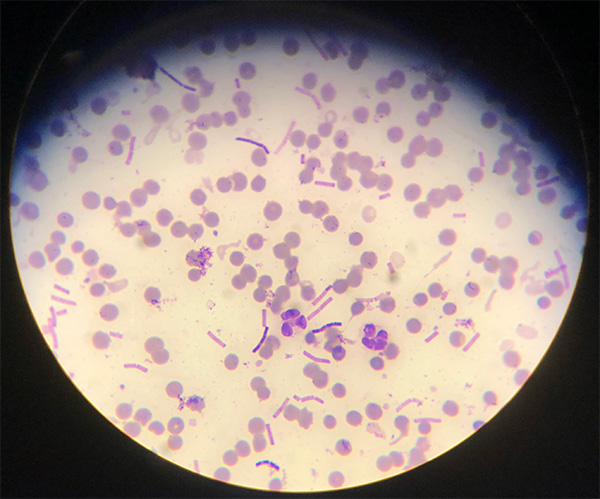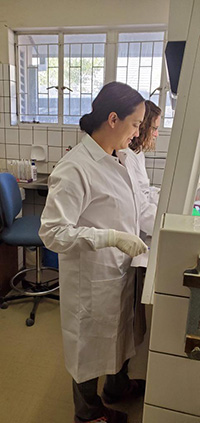University of Maine scientist Pauline Kamath conducts research on the dynamics of infectious diseases that can spread among wildlife, with the use of the high performance computing (HPC) resources at the Ohio Supercomputer Center (OSC). Kamath, an associate professor of animal health, analyzes genetic, ecological, immunological and epidemiological data to study the evolution and transmission of harmful pathogens in animals to better understand how to treat and control infections.

Prevention and control of pathogen infections may have widespread impacts on both animals and surrounding human populations. One example is Kamath's study on anthrax-infected zebra populations in southern Africa, where whole genome data from zebras are being used to identify genes associated with anthrax susceptibility. Due to the pathogen's ability to infect multiple species, understanding the evolution and transmissibility of anthrax is crucial to protect nearby livestock and human communities.
One data collection method employed by Kamath’s team involves taking tissue samples from their subjects from which all of the genomic DNA is extracted and sequenced within the sample without any specific criteria. This approach allows the researchers to gather large swaths of data for the identification of unknown pathogens associated with disease as well as pathogen surveillance.
In a recent project investigating a deer population with abnormally high rates of pneumonia-related deaths, the team is using this method to pinpoint the underlying cause, Kamath said.

The scientific approach yields a large amount of data that would be unmanageable without external HPC resources.
“We rely on the high performance computing at OSC to filter through this data and compare it against massive pre-existing databases,” Kamath said.
When working with a large data set, storage and transfer can also become challenging. Kamath’s team utilizes the storage at OSC to back up their processed data, granting them an additional level of security and simultaneous remote access to the data.
The team includes graduate and undergraduate students at the University of Maine who do not have prior experience with HPC. OSC OnDemand, the Center’s implementation of its open-source HPC portal Open OnDemand, simplifies the complexities of computing, helping to reduce the barrier to access.
“The interface was really helpful for a lot of students,” Kamath said. “Especially for undergraduates, I think it's a bit of a steep learning curve to learn without OnDemand.”

As an academic researcher outside of the State of Ohio, Kamath’s access to OSC’s resources is unique. In 2019 the University of Maine Advanced Research Computing, Security and Information Management (ARCSIM) established a business relationship with OSC that grants faculty, staff and students at the institution access to OSC’s resources, said Kevin Wentworth, assistant director of ARCSIM.
ARCSIM's director, Shane Moeykens, has worked with OSC for 20 years, collaborating extensively in his previous role in the computer-aided engineering software industry. When the University of Maine sought HPC resources backed by dependable customer support to help onboard new users quickly, Moeykens’ positive experience with OSC helped to inform his decision to partner with the Center, Wentworth said.
The relationship between OSC and the University of Maine allows researchers like Kamath to become educated in HPC, conduct cutting-edge research and store their results safely. Without access to the resources OSC provides, much of this research would not be able to be completed, Kamath said.
“We have received very positive feedback from our current University of Maine researchers who have used or are using OSC for their research and will continue to support this platform for the foreseeable future,” Wentworth said. “The customer service and rapid response of OSC’s staff have been paramount to our success.”
About OSC: The Ohio Supercomputer Center (OSC) addresses the rising computational demands of academic and industrial research communities by providing a robust shared infrastructure and proven expertise in advanced modeling, simulation and analysis. OSC empowers scientists with the services essential to making extraordinary discoveries and innovations, partners with businesses and industry to leverage computational science as a competitive force in the global knowledge economy and leads efforts to equip the workforce with the key technology skills required for 21st century jobs.